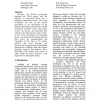Free Online Productivity Tools
i2Speak
i2Symbol
i2OCR
iTex2Img
iWeb2Print
iWeb2Shot
i2Type
iPdf2Split
iPdf2Merge
i2Bopomofo
i2Arabic
i2Style
i2Image
i2PDF
iLatex2Rtf
Sci2ools
HICSS
2008
IEEE
2008
IEEE
An Analysis of Korean National Information Strategy of IT839
Recently, the Korean government launched the IT839 project with the objective of converting Korea into a ubiquitous information society. This study investigates the role of the Korean government in the development of the national information infrastructure and the realization of IT839 vision. This paper reviews the historic and individual data related to the infrastructure project, draws on the social construction of technology theory as a framework for interpreting such data, traces the transformations and translation of this data in the public, political, and social discourse, and discusses the next generation of information infrastructure. Findings imply that despite optimistic prospects and proactive drive, uncertainty still remains with respect to where IT839 will evolve and how it will impact the new information milieu.
Biometrics | HICSS 2008 | Information Infrastructure | Korean Government | National Information Infrastructure | System Sciences |
| Added | 29 May 2010 |
| Updated | 29 May 2010 |
| Type | Conference |
| Year | 2008 |
| Where | HICSS |
| Authors | Dong Hee Shin, Won-Yong Kim |
Comments (0)

